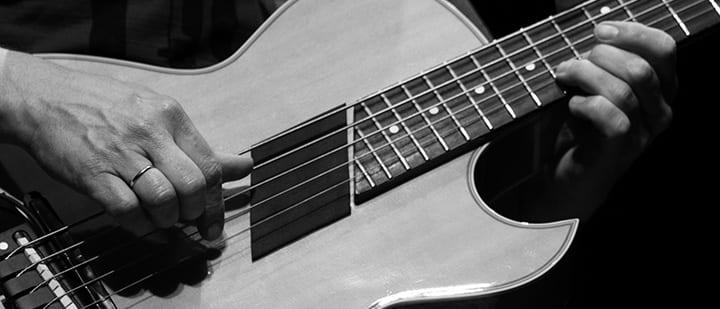What kind of preparation, thought, and practice goes into creating the best guitar solos? Take these six tips from Austin guitar teacher Samuel B. and you’ll be well on your way to guitar glory…
In reality, there’s probably no way to effectively teach someone to improvise. At this point in the curriculum, the student is ready to begin exploring that mysterious terrain known as expression. Though the parameters (an understanding of guitar scales and corresponding keys) are necessities, you’ll be on your own at this point in ways in which you have not previously been.
The good news is you will have already learned whole songs that you’re now ready to jazz up with advanced touches. While artistry (virtually by definition) is something that should be met with minimal-to-no interference, I’ve included pointers that should provide friendly encouragement to accompany your early development as a soloist.
There are no right or wrong notes.
Though you’ll want to remain firmly entrenched within the confines of a single scale (which you will have learned at the beginning of your guitar lessons) what you play is really up to you. Some notes do of course sound better than others, but the trick here is to create a melody as you would while singing to yourself. I recommend starting with three notes only. After a while, you’ll be in a position to branch out.
Envisioning what you want to play a few seconds ahead of time will improve your delivery.
On more than one occasion, it was brought to my attention that the best guitar solos are the ones for which a mental map has been created. Understand that you’re using your instrument as a means of communicating an internal message – one that transcends the boundaries of spoken language. Your job is to articulate that message not with words but rather with a sequence of notes. You’re responsible for determining the sequence that best articulates your internal cadences.
You can learn a lot by listening.
“You can observe a lot by watching” is sage advice attributable to baseball legend Yogi Berra. Playing a great solo is a comparable feat of conscious imitation. The trick is here is to imagine yourself in the shoes of whichever guitar heroes you’ve picked as role models and to try and follow the thought patterns that inspired their specific choices of notes. This way, you’ll learn to implement those patterns in your own playing.
There will always be new tricks to learn.
While waiting for a student to arrive, I find myself puttering with a note pattern that was likely inspired by my fondness for the music of Stevie Ray Vaughan. Though I’ve been a guitarist for nearly a quarter of a century, I’m finding the specific pieces of his unique brand of musical bombast very difficult to assemble and imitate. Multiple tricks of unfamiliarity (quick changes in tempo for instance) play into the equation.
Always be open to new ideas.
Ever since I was a teenager, I’ve made a point of not restricting my solos to a mere recitation of the notes of a scale. I’ve combined notes (playing more than one at a time) and even bent them with the same finger. I’ve also branched out into enharmonic ones on either side of whichever position corresponds to the solo effectively allowing my left hand to dance up and down the neck a bit.
Accept no limitations.
I’m convinced that all of us have a tendency to impose limits on our speed, dexterity, fluidity, and knowledge. In other words, we have an innate desire to reach a certain plateau (a musical one in this case) and coast. The truth is that nothing is more potentially damaging to one’s musicianship than coasting. Knowledge and skills are two things that should be steadily and actively pursued.
 Samuel B. teaches beginner guitar lessons in Austin, TX. He teaches lessons face-to-face without sheet music, which is his adaptation of Japanese instruction (involving a call-and-response method). Learn more about Samuel here!
Samuel B. teaches beginner guitar lessons in Austin, TX. He teaches lessons face-to-face without sheet music, which is his adaptation of Japanese instruction (involving a call-and-response method). Learn more about Samuel here!
Photo by jikatu
Suzy S.


